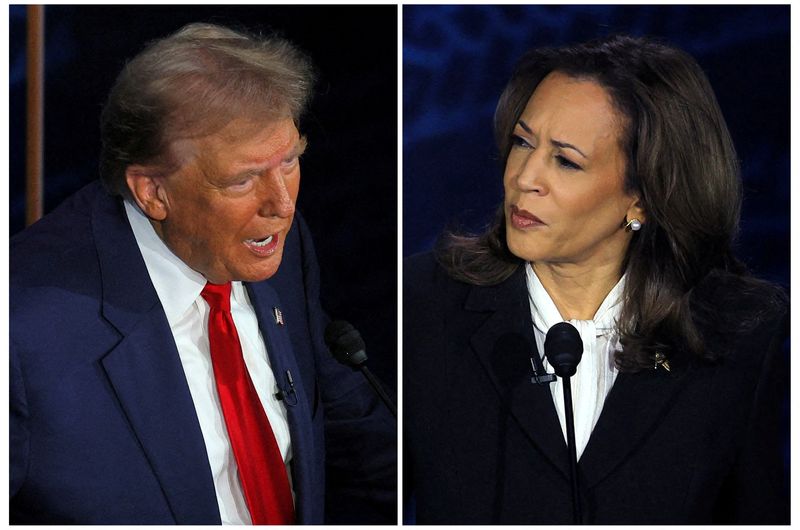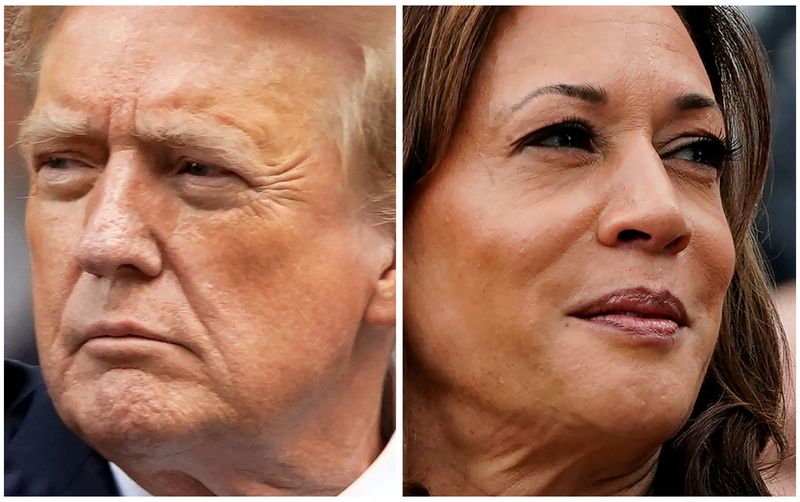By Jason Lange
WASHINGTON (Reuters) - Donald Trump's campaign vow to increase tariffs on imported goods, particularly from China, has the support of a narrow majority of U.S. voters, illustrating his economic advantage over rival Vice President Kamala Harris, a new Reuters/Ipsos poll shows.
The Republican former president and his Democratic opponent have both vowed to pursue tax cuts if they win the Nov. 5 election. But voters also credit Trump with being more likely to lower the $35 trillion national debt -- even though independent economic forecasters say his proposals would have the opposite effect.
Some 56% of registered voters in the Sept. 11-12 poll said they were more likely to support a candidate backing a new 10% tariff, or tax, on all imports, as well as a 60% tariff on imports from China. By comparison, 41% said they were less likely to support a candidate attached to that proposal.
The poll showed Harris with an overall 5-percentage-point lead over Trump nationally, though the U.S. presidential race will largely be decided in about seven battleground states where the race is tighter.
The poll details Trump's strengths on a key issue, the U.S. economy.
"This is what's keeping the election so close," said Karlyn Bowman, a polling expert at the conservative American Enterprise Institute.
Bowman said Trump's advantage flows from a perception the economy did well during his 2017-2021 administration, and from his success convincing voters U.S. economic problems stemmed from underhanded economic competition from other countries, notably China.
The poll found one in three Democrats said they were more likely to vote for a candidate backing higher tariffs and steep levies on Chinese goods, compared with two-thirds who said they were less likely to do so. Independent voters mirrored the wider electorate.
Until the COVID-19 pandemic ravaged the global economy in 2020, the U.S. economy by many measures performed well during the Trump administration, boosted by tax cuts for consumers. Unemployment was at its lowest in decades, although the national debt was rising and would explode during the pandemic.
This year, Trump has promised an array of tax cuts on the campaign trail, including ending income tax on tipped income - a proposal Harris also supports. On Thursday, he vowed to end taxes on overtime pay.
Seventy percent of registered voters supported the idea of exempting tips from taxes.
Trump called himself a "tariff man" during his presidency as he slapped levies on Chinese imports. Economists are wary of the idea, including at Wall Street bank Goldman Sachs, which estimates Trump's tariffs and other policies would slow the economy.
Harris mentioned Goldman Sachs' assessment in Tuesday's presidential debate and has noted that many independent economists believe Trump's policies would add to the national debt.
But the poll found that 37% of U.S. voters see Trump as more likely to focus on reducing the debt, compared with 30% who picked Harris. Another 30% said neither would do so.
Several prominent budget forecasters see Trump's tax proposals adding at least $3 trillion to federal deficits over a decade, while the same forecasters see Harris' plans adding less than $2 trillion or possibly reducing the debt.
Among voters polled, 47% said Trump was more likely to prioritize fostering a good climate for business, compared with 37% who picked Harris.
Harris, however, had a marginal 1-percentage-point advantage - 43% to 42% - when voters were asked who will seek to create "an economic climate that is good for me and my family."
Voters also said Harris was more likely to prioritize getting people affordable healthcare and building bridges and roads.

Trump had an advantage on inflation, which surged under Biden in 2021 and 2022. Some 43% of voters in the poll said Trump would be more likely to "lower prices for everyday things like groceries and gas," compared with 36% who picked Harris.
The Reuters/Ipsos poll gathered responses online from 1,405 registered voters, with a margin of error of about 3 percentage points.
